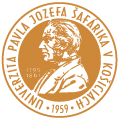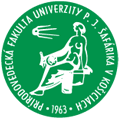New themes of Ph.D. thesis
A list of Ph.D. thesis offered by Condensed Matter Physics Department in study programmes Condensed Matter Physics a Advanced Materials in academic year 2016/2017.
Closing date for application: 01/06/2016
In case of interest, do not hesitate to contact the supervisor of the theme.
The regular duration of Ph.D. Study in Physics is 48 months.
Study programme: Condensed Matter Physics
Theme: The influence of exchange anisotropy and single-ion anisotropy on magneto-thermal properties of selected low-dimensional magnets
Supervisor: RNDr. Erik Čižmár, PhD.
Form of study: daily
Annotation:
Thesis is devoted to the experimental study of selected low-dimensional magnets with aim to study the influence of exchange anisotropy and single-ion anisotropy on field-induced change of their excitation spectra which may lead to increased change of magnetic entropy and enhanced magnetocaloric effect. The aim the study will be evaluation of entropy change and effectivity of magnetic cooling during adiabatic magnetization or demagnetization at low temperatures. Analysis of EPR spectra, magnetic and thermodynamic properties at low-temperatures will be performed for determination of characteristic parameters of magnetic system and their relation to possible magnetic cooling. Studied low-dimensional magnets will be based on transition metal ions Cu, Ni and also high-spin systems based on Mn ions.
Theme: Magnetization processes of soft magnetic composites
Supervisor: Prof. RNDr. Peter Kollár, DrSc.
Form of study: daily
Annotation:
The study is oriented on investigation of the magnetization reversal processes in soft magnetic composites as a function of magnetic field after demagnetization or at magnetization reversal on minor hysteresis loops in DC and AC magnetic fields. The aim is to investigate reversible and irreversible magnetization processes and their influence on macroscopic magnetic parameters of the composite material.
Theme: Magnetocaloric effect and relaxation phenomena in quantum and nanoscopic systems
Supervisor: Prof. Ing. Martin Orendáč, CSc.
Consultant: Assoc. Prof. RNDr. Adriana Zeleňáková, PhD.
Form of study: daily
Annotation:
The thesis is focused on the investigation of magnetocaloric effect and spin dynamics in the selected types of quantum magnetic systems. The studied systems will be prepared by methods of chemical synthesis and litographic technique. Experimental study will involve measurements of specific heat, susceptibility, magnetization at low temperatures and high magnetic fields. If a need arises, electron – spin resonance and infrared spectra will be added to the package of the data. The obtained data will be analyzed using current theoretical models to understand static and dynamic properties of low – energy states of the studied systems. This thesis offers the PhD. student skills in operating commercial devices for measurements of thermodynamic quantities at low temperatures, litographic technology for the preparation of samples. He will be involved in extending magnetocaloric measurements to milikelvin temperature range in a 3He – 4He dilution refrigerator. In addition, he will acquire physical insight in the relevant part of quantum magnetism, which together with experimental skills, will be completed by his abilities to work with commercial software packages for developing programs for measurements and data acquisition.
Theme: Influence of spin and spatial anisotropy on the magnetic properties of low-dimensional quantum magnets in the wide range of magnetic fields
Supervisor: Assoc. Prof. RNDr. Alžbeta Orendáčová, DrSc.
Consultant: RNDr. Robert Tarasenko, PhD.
Form of study: daily
Annotation:
In the nature, there can occur neither systems with perfect isotropy of spatial distribution of exchange interactions, nor those with the equal importance of all individual spin components acting in the exchange coupling. Importance of individual spin components is governed by spin-orbit coupling, projecting lattice symmetry to the spin system. As a result, in the nature, there is no spin isotropic (Heisenberg) system in the critical region. It occurs in the vicinity of a phase transition and in low-dimensional systems at all temperatures below the phase transition. The work is focused on the study of selected low-dimensional quantum magnets with various kind of lattice symmetry. Special attention will be given to the systems with the spin easy-plane (XY) anisotropy, which induces topological excitations vortices (V) and antivortices (AV). These excitations play a key role in the topologic phase transition, below which, the topological excitations can exist only in the form of bound V+AV pairs. The stability of the topological formations will be studied with respect to deviations from the XY anisotropy, mainly in the case of XYhp symmetries, i.e., when a few, p preferred directions occurs in the easy plane. It happens in all real systems as a result of magnetic field effect (p = 1), or the lattice symmetry (p = 2, 4, 6). For this purpose, various experimental techniques will be applied, including electron paramagnetic resonance, magnetization, susceptibility, specific heat and thermal conductivity. When need arises, further techniques will be used which are not implemented in the laboratories of P.J. Šafárik University.
Theme: In-situ depth profiling and scanning tunneling microscopy/spectroscopy of superconductors
Supervisor: Mgr. Tomáš Samuely, PhD.
Consultant: Mgr. Pavol Szabó, CSc.
Form of study: daily
Annotation:
Scanning tunneling spectroscopy is the perfect tool for the investigation of superconducting materials, since it is extremely sensitive to the slightest differences in the local density of states. As such, however, its ability to provide relevant information about the local physical properties is often obstructed by the degradation of the sample surface exposed to air. Our newly installed ultra-high vacuum system features an Ar ion sputtering gun for in-situ etching of the sample surface. The sample can be transferred subsequently into the integrated low-temperature scanning tunneling microscope without the necessity of being exposed to air. In addition, the etching process can be directly monitored by the X-ray photoelectron spectroscopy, providing the information about the chemical composition of the surface. This method is also integrated within the ultra-high vacuum system. Furthermore, by repetitive etching of the sample, depth profiling of inhomogeneous samples can be performed. The main goal of the thesis will be to devise and fine-tune a protocol for in-situ surface cleaning, depth profiling and tunneling spectroscopy and the investigation of unconventional superconductors by all three methods combined.
Theme: Manipulation with domain wall in thin magnetic wires
Supervisor: Prof. RNDr. Rastislav Varga, DrSc.
Consultant: RNDr. Kornel Richter, PhD.
Form of study: daily
Annotation:
The aim of the work is to study the possibility of manipulation of the domain wall propagation in thin magnetic wires by controlling its shape, structure, induced anisotropy, etc.
Theme: The study of dynamic magnetic properties and relaxation process in magnetic nanoparticles
Supervisor: Assoc. Prof. RNDr. Adriana Zeleňáková, PhD.
Form of study: daily
Annotation:
Mono-domain metal nanoparticles based on iron and cobalt are of great interest due to their intrinsic physical properties, such as macroscopic quantum tunnelling (MQT), quantum size effects, giant magnetic moment and surface spin frustration interplaying between the surface and core atoms. The spin structure of nanoparticles can be affected by inter-particle interactions. One of the powerful ways how to get a better insight into the nature of inter-particle interactions and estimate their strong is the analysis of ac magnetic susceptibility. The PhD. study is oriented on investigation of dynamic magnetic properties and analyses of relaxation processes. The aim is to study the possibility of change in relaxation processes by controlling the inter-particle interactions, energy barrier distribution, particles size, etc.
Study programme: Advanced Materials
Theme: The study of magnetic and structural properties nanoparticles for biomedical application
Supervisor: Assoc. Prof. RNDr. Adriana Zeleňáková, PhD.
Consultant: Assoc. Prof. RNDr. Vladimír Zeleňák, PhD.
Form of study: daily
Annotation:
Since magnetic particles have unique features, the development of a variety of medical applications has been possible. The most unique feature of magnetic particles is their reaction to a magnetic force, and this feature has been utilized in applications such as drug targeting and as contrast agents for magnetic resonance imaging (MRI). Recently, magnetic nanoparticles have attracted attention because of their potential as heating mediators for cancer therapy (hyperthermia). The aim of PhD work is optimization of synthesis strategy for preparation of magnetic nanoparticles for magnetic hyperthermia and as advanced drug delivery system.
Theme: Influence of anisotropy induced by thermal treatment (under mechanical stress, magnetic field, etc.) on structural and magnetic properties of rapidly quenched soft magnetic materials
Supervisor: Prof. RNDr. Rastislav Varga, DrSc.
Consultant: Assoc. Prof. RNDr. Zuzana Vargová, PhD.
Form of study: daily
Annotation:
The aim of the work is to study the influence of anisotropy induced by thermal treatment (under mechanical stress, magnetic field, etc.) on structural and magnetic properties of rapidly quenched materials in the shape of ribbons and wires.
Theme: Magnetic microwires for biomedical applications
Supervisor: Prof. RNDr. Rastislav Varga, DrSc.
Consultant: RNDr. Richter Kornel, PhD.
Form of study: daily
Annotation:
The aim of the work is to approve the possibility of magnetic microwires to be used as a sensors of temperature, stress, etc.. for biomedical applications.
Theme: Influence of chemical composition on the preparation of Heusler alloys
Supervisor: Assoc. Prof. RNDr. Zuzana Vargová, PhD.
Consultant: Prof. RNDr. Rastislav Varga, DrSc.
Form of study: daily
Annotation:
The aim of the work is to study the influence of chemical composition on the possibility to produce selected Heusler alloys with proper chemical short range ordering without the necessity of further thermal treatment.
Theme: Study of spin fluctuations influence on ground state in system on a base of RE(Ni,Ge)5 (RE = Ce, Yb, Gd) in single crystals and microcrystalline wires arrangement
Supervisor: Prof. RNDr. Marián Reiffers, DrSc.
Consultant: Prof. RNDr. Rastislav Varga, DrSc.
Form of study: daily
Annotation:
The aim of the work is to study the influence of of spin fluctuations influence on ground state in system on a base of RE(Ni,Ge)5 (RE = Ce, Yb, Gd). Next important parameter influencing the system behaviour will be the study of influence of crystals quality (sample in single crystalline form) and structure and dimensions (sample in microcrystalline form) on ground state of materials.
Theme: The study of preparation conditions of soft magnetic composites on their magnetic properties
Supervisor: Prof. RNDr. Peter Kollár, DrSc.
Form of study: daily
Annotation:
The study is oriented on investigation of preparation conditions of soft magnetic composites consisting of particles based on ferromagnetic metals and alloys with inorganic or organic insulators prepared by uniaxial compaction. The most important factors influenced the properties of resulting material are the chemical composition of ferromagnetic component, the fraction of non-ferromagnetic component, temperature, atmosphere and duration of compaction. The aim is optimization of compaction process of soft magnetic materials with required magnetic properties at middle-frequency ac magnetic fields.
Theme: Novel materials for sensors and data storage technologies
Supervisor: Mgr. Vladimír Komanický, PhD.
Consultant: Mgr. Tomáš Samuely, PhD.
Form of study: daily
Annotation:
Primary goal of the dissertation thesis is preparation of systems using nanotechnology and nanolithography and PVD methodologies that can be used to prepare various types of systems sensors for applications in fabrication of sensors and data storage technologies. These systems will be prepared in the form of thin films, multilayers and other types of nanostructures.



